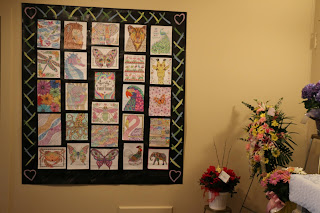This is My Chair
This is my chair
This is my couch
That is my bed
That is my bench
There is my chaise
There is my settee
Those are my footstools
Those are my rugs
Everywhere is my place to sleep
Perhaps you should just get a hotel room.
Francesco Marciuliano, I Could Pee on This: and other poems of cats, Chronicle Books, 2012.
 I just wasn't sure which poem to pick from this cute little volume; each one was funnier than the last. Then Rod came upstairs planning to go to bed, only to see the bedspread covered with my books and papers and Kit Kat well established on his side of the bed. There are people like us that allow such things to happen and then there are people who don't have pets...I suppose you have your reasons, and they are probably good reasons, but still; look what you're missing!
I just wasn't sure which poem to pick from this cute little volume; each one was funnier than the last. Then Rod came upstairs planning to go to bed, only to see the bedspread covered with my books and papers and Kit Kat well established on his side of the bed. There are people like us that allow such things to happen and then there are people who don't have pets...I suppose you have your reasons, and they are probably good reasons, but still; look what you're missing!
I really can't stop at one poem, just like I couldn't stop at one cat. As I was paging through the book for another poem, I found some cat hair between the pages. Have the cats been reading this on their own?? This next poem strongly hints at the possibility.
Your Keyboard
Suetdhe8defdisjas
I just typed a poem in your presentation
chesothekstevdswdj
I just typed a joke in your email
nosyd76mhdlwdag
I just typed something personal
on your update
Vos7swps8s73wbk
I just typed my political views
in your tweet
Bhst9ahw-2ynsyhz
I just accidentally typed in
your bank account password
Kitty's gonna buy himself
a new scratching post






